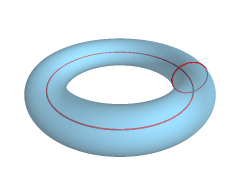|
(2015
midterm assignment) Model Student Midterm answers 2015 (Index) Essay 1: Compare, contrast, and evaluate Narratives of the Future |
 |
Michael Bradshaw
The Hero's Journey Through Time
In
our Literature of the Future class, we have covered three types of future
narratives; the Creation/Apocalypse narrative, the Evolution narrative, and the
Alternative Futures narrative. While the three narratives have differing takes
on the future, many of the novels and short stories follow the literary themes
of a romance, or the hero's journey. Choosing selections for all three future
narratives, I will attempt to uncover the romantic undertones of each, and how
these themes are affected by the narrative in which they appear. For examples of
the Creation/Apocalypse narrative, I will be using the books of Genesis,
and Revelation. For the Evolution narrative, I will be using Parable
of the Sower, and Stone Lives. Finally, I will draw from Mozart in
Mirrorshades, for our Alternative Future.
The Apocalyptic Romance
Certainly the most straightforward of the three narratives, the
Creation/Apocalypse narrative contains a definitive beginning and end to its
universe. From "In the beginning, God created the heavens and the earth,"
(Genesis 1:1 NIV), to "The grace of the Lord Jesus be with God's people. Amen"
(Revelation 22:21 NIV) the Bible tells of a God that created the cosmos, saw his
creation fall, and resolved to deliver them from their own devices. Katasha
DeRouen, in her 2013 midterm wrote, "A very profound correlation to time
involves the denotation of linear events within the text." God is the Alpha and
Omega, the beginning and the end. God in all his incarnations is also the hero
of perhaps the first romance narrative. God creates man humans in his own image,
"So God created man in his own image, in the image of God he created them; male
and female he created them." (Genesis 2:3 NIV). Mankind plays the role of both
villain and damsel in distress in this saga. With Adam and Eve's eating of the
forbidden fruit, they committed a villainous act, and in doing so are cast out
from the presence of God (Genesis 3:22-24). After the Fall, mankind is in need
of rescue which God provides through the crucifixion of his son Jesus. "God made
him who had no sin to be sin for us, so that in him we might become the
righteousness of God." (2 Corinthians 5:21 NIV). When the real villains finally
appear, Jesus rides down from Heaven on a white horse (Revelation 19:11-16 NIV),
saving his people.
The Evolution of the Hero
The
evolution narrative can be a bit more convoluted, as there is no definite ending
to the universe. "God is change." (Parable of the Sower). These words
encapsulate the core of the evolution narrative. The universe may not end, but
the twists and turns it can take, may lead it to become unrecognizable to those
it left behind. This may make it difficult to see the hero's journey in many
narratives, but it is present in the novels I am discussing.
Lauren's journey in The Parable of the Sower, may be the most archetypal
depiction of the Hero's Journey that we have read in class. She literally leaves
her home, finds companions, and begins to fulfill what she believes is her
destiny. Sara Perkins states that "A popular theme in this type of novel is a
powerful and overwhelming strive for survival... Even though her world has
fallen to rubble around her, slowly she begins to change who can live and
survive outside the walls of her community. She is not the same girl from the
beginning of the book..." This is the crux of the Hero's Journey. In Parable
of the Sower, we see Lauren change from a scared young woman, to group
leader, to quasi prophetess throughout the course of her journey. The changes in
her environment, from one of at least implied safety, to one of outright danger,
necessitated the changes in Lauren, and prompted her to put her ideas to use.
Stone's journey in Stone Lives, seems much more circumspect at first
glance. A street urchin, uplifted from the gutter to the gilded class in order
to fulfill the desires of a dying leader, seems more like a puppet than a hero.
Indeed, Stone's entire life seemed to be orchestrated so that Alice Citrine can
have her own twisted version of immortality. Yet Stone's journey parallels
nicely with that of King Arthur. Both came from humble beginnings, although
Arthur didn't get his eyes gouged out. Both receive an item which help them on
their quest. King Arthur is given Excalibur by the Lady of the Lake, and Stone
is given back his sight by Alice Citrine. Arthur has Merlin to guide him, while
Stone has June. Both strive to use their power to better their homelands.
Alternative Future, Similar Journey
Alternative futures are where, to paraphrase a certain Time Lord, things tend to
become a bit wibbley wobbley. Is it even possible for such a straightforward
narrative like the romance to exist in a setting that can morph and branch off
into a nearly limitless realm of possibilities? Adria Weger cites Well's Law as
a way for all three future narratives to exist within the same story. "The thing
that makes such imaginations interesting is their translation in to commonplace
terms... [the writer must] domesticate the impossible hypothesis." I too
cite this law as the reason the rules of romance can walk hand in hand with the
bizarre. Weger goes on to state, "For a world in science fiction to be
believable, it must not change too much from reality so that the reader may
still identify with it..." one way to do this is to insert a familiar trope to
give the reader something recognizable to hold onto as he or she takes the
journey down the rabbit hole of alternative futures.
One
might ask how can the concept of the Hero's journey possibly be applied to
Mozart in Mirrorshades, and, on the surface, one's concerns would be
valid. However, these concerns may be predicated on two primary fallacies; the
first is that the main character of the story must be the one undertaking the
journey; the second is that the journey must have some noble purpose, or that it
must be fulfilled in a just way. Rice is not the hero of Mozart in
Mirrorshades. He is merely the looking glass through which the readers peer
into his world. He does not meaningfully progress the story; he just happens to
have just enough power that he is in the middle of events as they happen. Mozart
is the true catalyst of the story. The famous composer had all of his most
famous works given to him in this reality, which seemed to cause a bit of an
identity crisis. Instead of becoming on of the most renowned composers in
history, he becomes a pop star, who decides he must travel to "Realtime". It may
be more apt to call this a "Villain's Journey," as the way Mozart goes about
this in monstrous. Yet the steps are still there. Mozart desires to go to
Realtime, and finds Parker, an radio executive willing to help (Mozart). He then
foments a rebellion among the Masonites causing his site to be evacuated back to
Realtime with Mozart along for the ride.
While not always apparent, the tropes of the romance narrative, are prevalent throughout literature. Literature of the future is no different. From one of the oldest examples of the genre to the bizarre iterations of modern time, these formulae are consistently to give the narratives a human touch. Everyone loves a good romance.
 |
 |
 |
